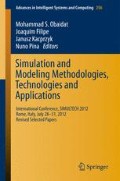Abstract
Greenhouse gas emission scenarios (through 2100) developed by the Intergovernmental Panel on Climate Change when converted to concentrations and atmospheric temperatures through the use of climate models result in a wide range of concentrations and temperatures with a rather simple interpretation: the higher the emissions the higher the concentrations and temperatures. Therefore the uncertainty in the projected temperature due to the uncertainty in the emissions is large. Linguistic rules are obtained through the use of linear emission scenarios and the Magicc model. These rules describe the relations between the concentrations (input) and the temperature increase for the year 2100 (output) and are used to build a fuzzy model. Another model is presented that includes, as a second source of uncertainty in input, the climate sensitivity to explore its effects on the temperature. Models are attractive because their simplicity and capability to integrate the uncertainties to the input and the output.
Access this chapter
Tax calculation will be finalised at checkout
Purchases are for personal use only
Preview
Unable to display preview. Download preview PDF.
References
Dubois, D., Prade, H.M.: Fuzzy Sets and Systems: Theory and Applications. Academic Press (1980)
Gay, C., Estrada, F.: Objective probabilities about future climate are a matter of opinion. Climatic Change (2009), http://dx.doi.org/10.1007/s10584-009-9681-4
Solomon, S., Qin, D., Manning, M., Chen, Z., Marquis, M., Averyt, K.B., Tignor, M., Miller, H.L. (eds.): IPCC-WGI, 2007: Climate Change 2007: The Physical Science Basis. Contribution of Working Group I to the Fourth Assessment Report of the Intergovernmental Panel on Climate Change, p. 996. Cambridge University Press, Cambridge (2007)
Houghton, J.T., Ding, Y., Griggs, D.J., Noguer, M., van der Linden, P.J., Dai, X., Maskell, K., Johnson, C.A. (eds.): IPCC-WGI, 2001: Climate Change 2001: The Scientific Basis, Contribution of Working Group I to the Third Assessment Report of the Intergovernmental Panel on Climate Change. Cambridge University Press (2001) ISBN 0-521-80767-0 (pb: 0-521-01495-6)
Jaynes, E.T.: Information Theory and Statistical Mechanics: Phys. Rev. 106, 620–630 (1957)
Klir, G., Elias, D.: Architecture of Systems Problem Solving, 2nd edn. Plenum Press, NY (2002)
Nakicenovic, N., Alcamo, J., Davis, G., de Vries, B., Fenhann, J., Gaffin, S., Gregory, K., Grübler, A., Jung, T.Y., Kram, T., La Rovere, E.L., Michaelis, L., Mori, S., Morita, T., Pepper, W., Pitcher, H., Price, L., Riahi, K., Roehrl, A., Rogner, H.-H., Sankovski, A., Schlesinger, M., Shukla, P., Smith, S., Swart, R., van Rooijen, S., Victor, N., Dadi, Z.: Special Report on Emissions Scenarios: A Special Report of Working Group III of the Intergovernmental Panel on Climate Change, p. 599. Cambridge University Press, Cambridge (2000)
Ross, T.J.: Fuzzy Logic with Engineering Applications, 2nd edn. John Wiley & Sons (2004)
Schneider, S.H.: Congressional Testimony: U.S. Senate Committee on Commerce, Science and Transportation, Hearing on “The Case for Climate Change Action” (October 1, 2003)
Schmidt, G.A.: The physics of climate modeling. Phys. Today 60(1), 72–73 (2007)
Wigley, T.M.L.: MAGICC/SCENGEN V. 5.3: User Manual (version 2), p. 80. NCAR, Boulder, CO. (2008), http://www.cgd.ucar.edu/cas/wigley/magicc/
Zadeh, L.A.: Fuzzy Sets. Information and Control 8(3), 338–353 (1965)
Author information
Authors and Affiliations
Corresponding author
Editor information
Editors and Affiliations
Rights and permissions
Copyright information
© 2014 Springer International Publishing Switzerland
About this chapter
Cite this chapter
García, C.G., Meneses, O.S., Martínez-López, B., Nebot, À., Estrada, F. (2014). Fuzzy Models: Easier to Understand and an Easier Way to Handle Uncertainties in Climate Change Research. In: Obaidat, M., Filipe, J., Kacprzyk, J., Pina, N. (eds) Simulation and Modeling Methodologies, Technologies and Applications. Advances in Intelligent Systems and Computing, vol 256. Springer, Cham. https://doi.org/10.1007/978-3-319-03581-9_16
Download citation
DOI: https://doi.org/10.1007/978-3-319-03581-9_16
Publisher Name: Springer, Cham
Print ISBN: 978-3-319-03580-2
Online ISBN: 978-3-319-03581-9
eBook Packages: EngineeringEngineering (R0)

